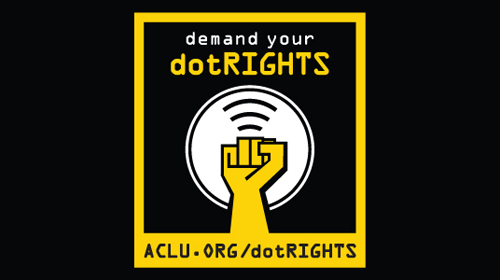
In the digital age that we live in today, we are constantly exposing our personal information online. From using cell phones and GPS devices to online shopping and sending e-mail, the things we do and say online leave behind ever-growing trails of personal information. The ¿œ∞ƒ√≈ø™Ω±Ω·π˚ believes that Americans shouldn‚Äôt have to choose between using new technology and keeping control of your private information. Each week, we feature some of the most interesting news related to technology and civil liberties that we‚Äôve spotted from the previous week.
[ars technica]
"Here was a regional government agency blocking wireless access in response to a public protest. Groups like the ¿œ∞ƒ√≈ø™Ω±Ω·π˚ (¿œ∞ƒ√≈ø™Ω±Ω·π˚) and the Electronic Frontier Foundation (EFF) filed complaints."
[¿œ∞ƒ√≈ø™Ω±Ω·π˚ Blog of Rights]
Twitter has filed a motion in state court in New York seeking to quash a court order requiring it to turn over information about one of its users and his communications on Twitter. This particular case involves a Twitter user, Malcolm Harris, who is being prosecuted by the District Attorney’s Office in Manhattan for disorderly conduct in connection with the that occurred on the Brooklyn Bridge last year.
See Also [Mashable]
See Also [Wired]
See Also [Forbes]
[New York Times]
"Continuing its crackdown on Internet privacy violations, on Tuesday with violating federal law by breaching its promise not to share users’ personal information, including their Web browsing habits, with advertising companies."
See Also [Wired]
See Also [Read Write Web]
[CNET]
"A new bill introduced yesterday in the U.S. Senate would seek to stop employers from requesting passwords or access to an employee's account on Facebook and other social networks."
See Also Password Protection Legislation Introduced In House And Senate [¿œ∞ƒ√≈ø™Ω±Ω·π˚]
See Also Password Protection Act of 2012: A Good Start Against Employer Snooping [¿œ∞ƒ√≈ø™Ω±Ω·π˚ Free Future]
[Computer World]
"U.S. Senator Al Franken has in a letter asked the Department of Justice for information on its practices in requesting location information from wireless carriers, following reports that law enforcement agencies are requesting such information sometimes without warrants."
See Also DOJ Cell Phone Tracking: Excellent questions, Senator [¿œ∞ƒ√≈ø™Ω±Ω·π˚ Free Future]
[Wired]
"In other words, if an Air Force drone accidentally spies on an American citizen, the Air Force will have three months to figure out if it was legally allowed to put that person under surveillance in the first place."
Learn more about dotRights: Sign up for breaking news alerts, , and .

